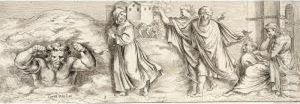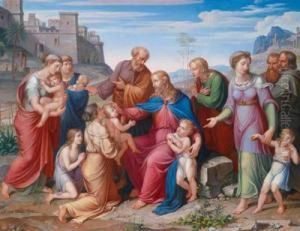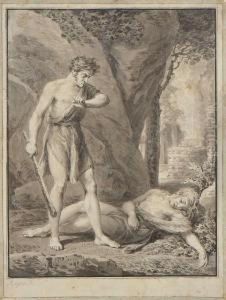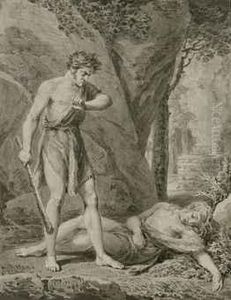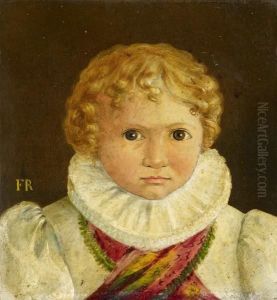Franz Riepenhausen Paintings
Franz Riepenhausen was a German painter and engraver born in Göttingen, Germany, in 1786. He was one of the twin sons of Ernst Ludwig Riepenhausen, a respected engraver, which meant that Franz, alongside his brother Johannes Riepenhausen, was introduced to the world of art and its practices at a young age. The Riepenhausen family was deeply involved in the art scene of the time, and Franz's early exposure to this environment profoundly influenced his career path and artistic development.
Franz Riepenhausen's work is often associated with the Romantic period, a movement that emphasized intense emotion and individualism as well as glorification of the past and nature, reacting against the Industrial Revolution and the Enlightenment. He and his brother were particularly known for their work that drew inspiration from the Middle Ages and the Renaissance, focusing on historical and religious themes. Franz's artistic style was characterized by its detailed and precise line work, a testament to his skills as an engraver, and his paintings often conveyed a sense of romantic melancholy and nostalgia for a bygone era.
In addition to his paintings, Franz made significant contributions as an engraver and illustrator, working on various projects that included illustrations for books and literary works. One of his most notable projects was the illustrations for Ludwig Tieck's collection of old German poems, which further cemented his reputation as an artist who could vividly bring historical and mythical subjects to life.
Despite his contributions to the Romantic movement and the art world, Franz Riepenhausen's work was somewhat overshadowed by the achievements of other contemporaries of the time. He spent a significant portion of his career in Italy, particularly in Rome, where he was part of the German artists' colony. This period was crucial for his artistic development, as the exposure to Italian art and culture influenced his work significantly. Unfortunately, Franz's life was cut short when he died in Rome in 1831.
Franz Riepenhausen's legacy is that of an artist who was deeply dedicated to exploring historical themes through his art. His works reflect a bygone era with a romantic sensibility, capturing the imagination of those who have an affinity for the past. Although not as widely recognized as some of his contemporaries, his contributions to the Romantic movement and his ability to encapsulate the spirit of history in his art remain appreciated by art historians and enthusiasts alike.
